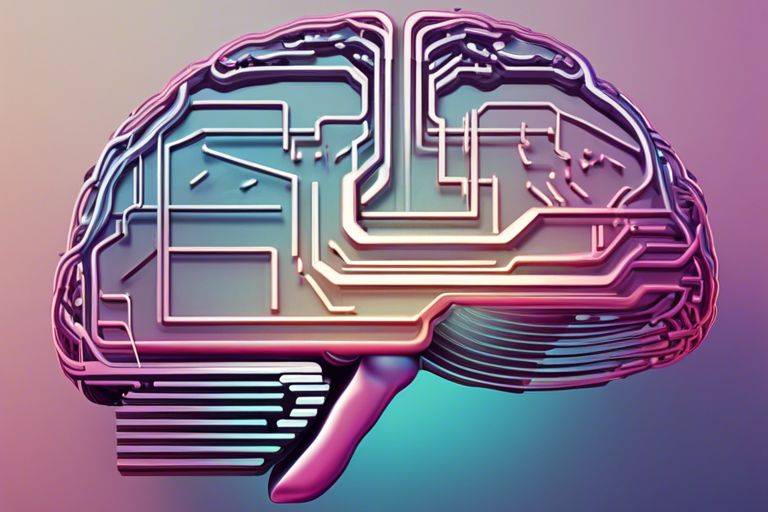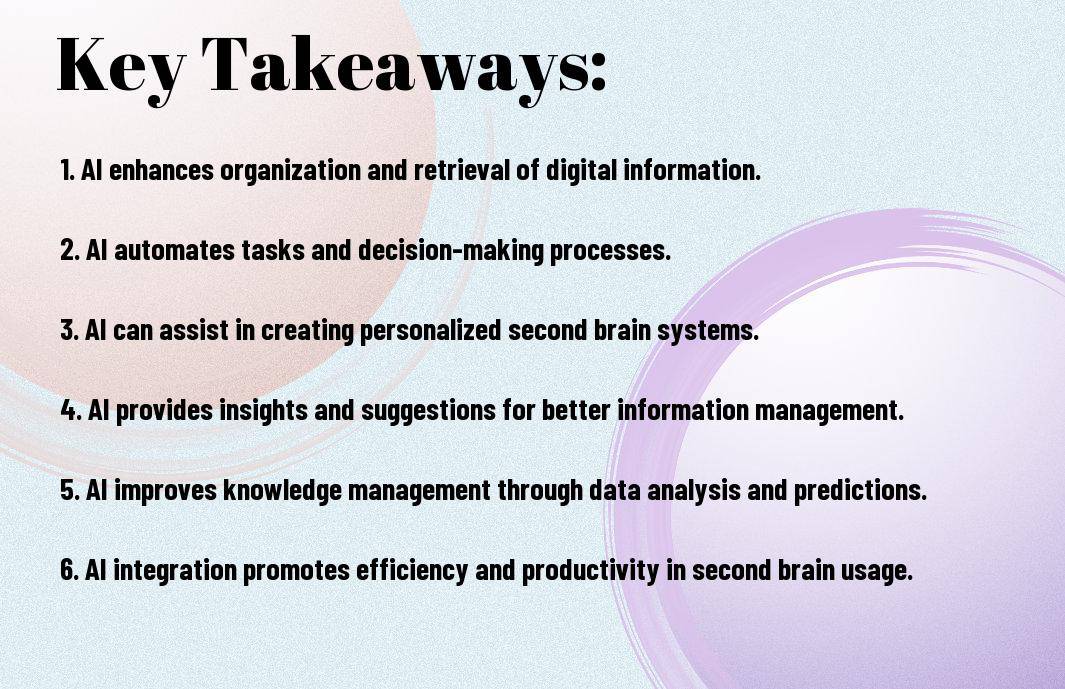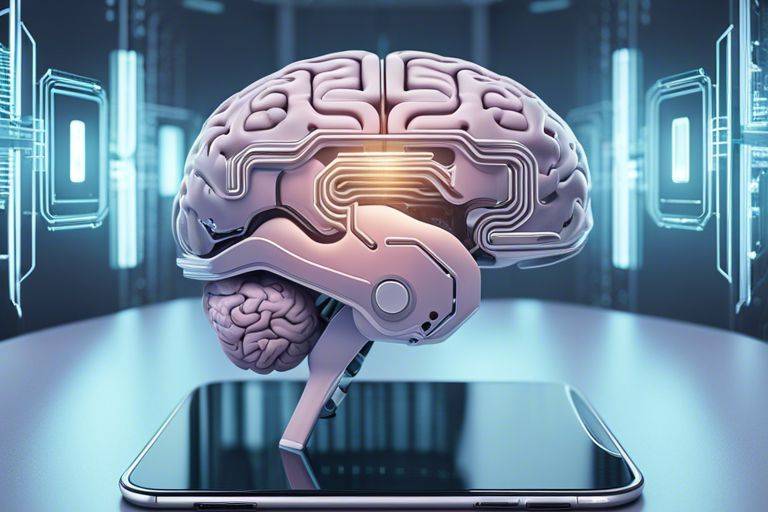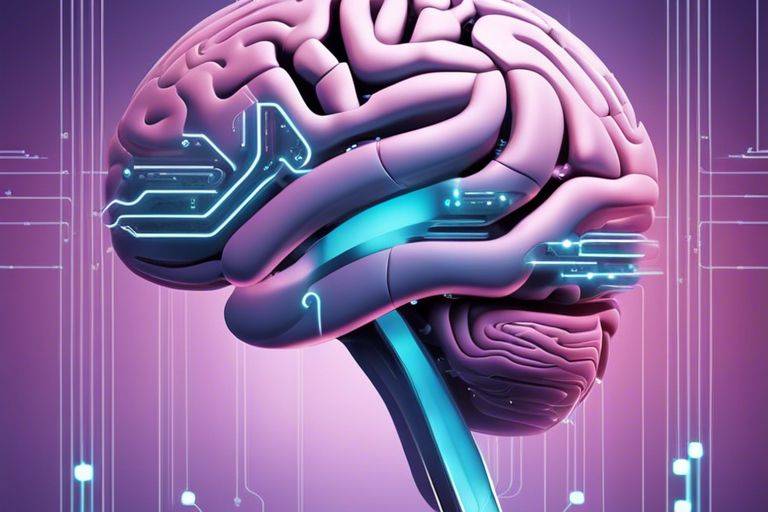Artificial intelligence! There’s a fascinating evolution happening in the world of technology that is bringing us closer to the concept of a second brain. This second brain, driven by artificial intelligence (AI), aims to enhance our cognitive abilities, memory, and overall productivity. By leveraging AI algorithms and data processing capabilities, this concept can transform the way we organize information, make decisions, and interact with the digital world.
Key Takeaways:
- AI enhances the Second Brain: Artificial Intelligence technologies play a crucial role in evolving the Second Brain concept by providing tools for information organization, retrieval, and automation.
- Improved personalization: AI can enhance the Second Brain experience by personalizing content recommendation and organizing information based on individual preferences and habits.
- Efficient information processing: AI algorithms can help in processing vast amounts of data and extracting relevant insights, making the Second Brain more effective in handling information overload.
- Enhanced decision-making: AI-powered analytics can assist individuals in making better decisions by providing data-driven insights and recommendations based on the content stored in their Second Brain.
- Integration with IoT devices: AI can enable seamless integration of the Second Brain with Internet of Things (IoT) devices, allowing for automatic data capture and organization from various sources.
- Continuous learning and improvement: AI technologies can facilitate continuous learning within the Second Brain system, adapting to user behavior and preferences to offer relevant and timely information.
- Data security and privacy: While AI enhances the Second Brain functionality, there is a need to address concerns related to data security and privacy to ensure safe storage and access to personal information.


The Second Brain Concept: A Primer
Origins and Evolution of the Second Brain Idea
Second only to our main brain, the concept of the “second brain” refers to the intricate network of neurons that make up our enteric nervous system, which is found in the gut. Clearly, this idea challenges traditional beliefs that the brain is the sole commander of our bodily functions.
Components and Functions of the Second Brain
Origins of the term ‘second brain’ can be traced back to the late 19th century, but it wasn’t until the past few decades that significant research has underscored the importance and complexity of this enteric nervous system in our gut.
The enteric nervous system consists of over 100 million neurons, working independently of the brain to regulate digestion, produce neurotransmitters, and communicate with the central nervous system. The interaction between these two ‘brains’ is fundamental to our overall physical and mental well-being.
AI as a Catalyst for the Second Brain
Keep Unlocking Your Second Brain: The Power of AI at the forefront of your mind as we probe into how AI is revolutionizing the concept of the Second Brain.
How AI is Transforming Our Mental Workloads
Second Brain technology, powered by AI, is changing the way we handle information and manage our mental tasks. This innovative technology helps individuals offload cognitive tasks to intelligent algorithms, allowing for more efficient organization and retrieval of data. With AI’s ability to analyze patterns in our behaviors and preferences, our Second Brain becomes tailored to our unique needs, enhancing productivity and decision-making.
Seamless Integration: AI in Everyday Life
An integral part of modern life, AI seamlessly integrates into our daily routines through smart devices and applications. For instance, virtual assistants like Siri and Alexa rely on AI algorithms to understand and respond to our commands, streamlining tasks and saving time. From personalized recommendations on streaming platforms to predictive text suggestions in messaging apps, AI enhances our interactions with technology in positive ways.
Enhancing Memory and Recall with AI
Many advancements in artificial intelligence (AI) have revolutionized how we enhance memory and recall. With the aid of AI technologies, we can now access a second brain that helps us store, organize, and retrieve information more efficiently than ever before.
Never Forget Again: AI-powered Reminders and Notes
Memory is a critical aspect of cognitive function, and AI has significantly improved our ability to remember important details. AI-powered reminders and note-taking applications can help us keep track of appointments, deadlines, and imperative information. These tools utilize machine learning algorithms to analyze patterns in our behavior and provide timely prompts to ensure we never forget important tasks.
Techniques for Effective Information Retrieval
Retrieval of stored information is just as crucial as encoding it in the first place. AI can assist in retrieving data efficiently through advanced search algorithms and personalized recommendations. By utilizing AI-powered search engines and knowledge graphs, we can quickly access the information we need, making the retrieval process more streamlined and effective.
AI-Driven Decision Making Support
Despite the ongoing debate surrounding the capabilities and limitations of artificial intelligence (AI), there is no denying the significant impact it has on supporting decision-making processes. AI technologies have revolutionized the concept of a second brain by offering insights, recommendations, and analysis to aid individuals in making informed choices.
Navigating Life Choices with AI Insights
Making life decisions can be overwhelming, whether it’s choosing a career path, relocating to a new city, or even deciding on a romantic partner. With AI-driven decision-making support, individuals can gather relevant information, explore different scenarios, and receive personalized recommendations based on their preferences and goals. Gone are the days of solely relying on gut feelings or external advice; AI can provide valuable insights to help individuals navigate complex life choices effectively.
From Data Overload to Actionable Intelligence
One challenge that many people face in today’s digital age is the sheer volume of data available, leading to information overload. AI addresses this issue by transforming raw data into actionable intelligence through advanced analytics, pattern recognition, and machine learning algorithms. By leveraging AI technologies, individuals can sift through vast amounts of data more efficiently, extract meaningful insights, and convert them into strategic actions.
Overload Turning data into actionable intelligence provides individuals with a competitive edge, enabling them to make well-informed decisions and take proactive steps towards achieving their goals.

Learning and Creativity: AI’s Role in Personal Development
For many individuals, personal development is a journey of continuous learning and growth. With the aid of AI technologies, this journey has been revolutionized, offering tailored learning experiences and fostering creativity in unprecedented ways.
Tailored Learning Experiences through AI
One of the most significant advantages of AI in personal development is its ability to provide tailored learning experiences. AI algorithms analyze individual learning behaviors and preferences to customize education materials, pace, and style. This personalized approach not only enhances comprehension and retention but also keeps learners engaged and motivated throughout their learning journey.
Fostering Creativity with AI Tools
Fostering creativity is crucial for personal growth and development. AI tools play a crucial role in unlocking one’s creative potential by offering innovative solutions, generating ideas, and providing instant feedback. Through AI-powered platforms, individuals can explore new avenues, experiment with different concepts, and collaborate with like-minded creatives from around the world.
Fostering creativity with AI tools empowers individuals to think outside the box, challenge conventional thoughts, and unleash their imagination in ways that were previously unimaginable.
Ethical and Privacy Considerations in AI
Balancing Innovation with Responsibility
Not only does Artificial Intelligence (AI) bring about incredible advancements, but it also raises important ethical and privacy concerns that need to be carefully considered. As we dive deeper into the second brain concept, it is crucial to strike a balance between innovation and responsibility.
Protecting Your Digital Thoughts: AI and Privacy
To safeguard the privacy of your digital thoughts in the context of AI, it is important to establish clear guidelines and regulations. AI has the potential to analyze and interpret vast amounts of personal data, raising concerns about data breaches and unauthorized access. Therefore, individuals and organizations must work together to implement robust security measures and encryption protocols.
The protection of digital thoughts extends beyond just personal data; it also encompasses intellectual property rights and confidentiality. For instance, AI algorithms should be designed in a way that prioritizes data protection and respects the boundaries of individual privacy. By fostering a culture of accountability and transparency, we can navigate the ethical complexities of AI while reaping its benefits for the second brain evolution.
Looking Ahead: The Future of AI and the Second Brain
After reading about How AI Can Help You Build A Second Brain in 2024, we can see the immense potential that AI holds in revolutionizing the way we manage information and enhance our cognitive abilities through the concept of the second brain. Predictions and Trends in AI Development are paving the way for more advanced tools and applications that will further augment our daily lives.
Predictions and Trends in AI Development
Brain: The future of AI and the second brain will likely see the integration of more advanced machine learning algorithms, natural language processing, and neural networks, allowing for even more personalized and intuitive information organization and retrieval systems. This development has the potential to significantly streamline our workflows, boost productivity, and enhance creativity.
Preparing for the Next Generation of the Second Brain
Brain: A key aspect of Preparing for the Next Generation of the Second Brain will involve staying informed and adapting to the rapidly changing landscape of AI technologies. Embracing continual learning and staying open to new tools and methodologies will be necessary in maximizing the benefits of AI integration into our daily lives.
Final Words
The evolution of the Second Brain concept with the integration of AI technology has revolutionized how we manage information, make decisions, and streamline our daily tasks. AI has enhanced our ability to store, process, and access vast amounts of data, turning our devices into powerful tools that augment our cognitive capabilities. As AI continues to advance, the potential for the Second Brain concept to become an invaluable asset in our personal and professional lives is limitless.
FAQ
Q: What is the Second Brain Concept?
A: The Second Brain Concept refers to the idea that the human gut functions like a second brain, with its own complex network of neurons that can influence our mood, behavior, and overall health.
Q: How does AI play a role in the Second Brain Concept?
A: AI technologies can help analyze vast amounts of data related to gut health and its connection to the brain, allowing researchers to gain insights and develop new strategies for improving overall well-being.
Q: What are the benefits of using AI in understanding the Second Brain Concept?
A: AI can provide more personalized and precise recommendations for diet, lifestyle changes, and treatments to support gut health and optimize the brain-gut connection.
Q: Can AI help diagnose gut-related conditions that affect the Second Brain?
A: Yes, AI algorithms can analyze symptoms, genetic factors, and other health data to identify potential gut issues that may be impacting brain function, leading to earlier detection and intervention.
Q: How can individuals leverage AI to improve their Second Brain health?
A: By using AI-powered apps and devices that track diet, exercise, and symptoms, individuals can gain valuable insights into their gut health and receive personalized recommendations for maintaining a healthy Second Brain.
Q: Is the Second Brain Concept widely accepted in the scientific community?
A: Yes, the Second Brain Concept is supported by research in the field of neurogastroenterology, which focuses on the intricate connection between the brain and the gut and how it impacts overall health.
Q: What does the future hold for AI and the Second Brain Concept?
A: As AI technologies continue to advance, we can expect more sophisticated tools and strategies for understanding and enhancing the Second Brain, leading to groundbreaking discoveries in brain-gut health and well-being.



